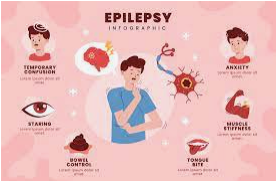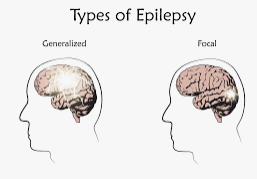What is Epilepsy? Its Causes, Symptoms and Treatment
What is Epilepsy?
Epilepsy is a brain disorder due to recurrent seizures. A seizure is often defined as a sudden change in behavior caused by a temporary change in electrical activity in the brain. In general, the brain continuously generates small electrical impulses in a controlled manner. These emotions are transmitted by neurons—networks of nerve cells in the brain—and throughout the body by chemical messengers called neurotransmitters.
In epilepsy, the electrical impulses in the brain often become out of balance, causing seizures. In patients with epileptic seizures, sudden and continuous drops in electrical energy disrupt the normal electrical system and can affect their thoughts, actions, or emotions.

Also Read:
-
The Food and Water System – Softpik Topics
-
Division of Global Health Protection | Global Health Protection Programme
-
Heart Disease Treatment and its Preventions
Epilepsy Risk Factors
There are some risk factors of Epilepsy:
- Premature or low birth-weight babies
- Stress during childbirth (such as lack of oxygen).
- Seizures at 1 month of age
- Abnormal brain structures at birth
- stroke
- Abnormal blood vessels in the brain
- Severe brain damage or lack of oxygen to the brain
- brain tumor
- Brain infections, such as meningitis and encephalitis
- Stroke due to clogged arteries
- Cerebral palsy
- Mental illness
- Multiple days of head injury attacks
- Family history of epilepsy or febrile seizures
- Alzheimer’s disease (a late-onset disease)
- Prolonged shivering with fever (fever)
- Must abuse alcohol or drugs
Diagnosis
Doctors diagnose dementia based on symptoms, physical signs, and test results such as electroencephalogram (EEG), computed tomography (CT, CAT), and magnetic resonance imaging (MRI).
Both types of epilepsy and seizures should be closely monitored. There are several main classifications of seizures, most of which are related to several specific conditions.
Treatment for Epilepsy
Epilepsy can be treated with antiepileptic drugs (AEDs), diet therapy, and surgery. Medications are the first line of treatment in almost all cases of insomnia. Some patients who have had only one illness and whose tests show an unlikely recurrence may not require medication. These drugs treat the symptoms of asthma (diarrhea), not the underlying disease. They are highly effective and seizures are controlled in the majority of patients (up to 70%). The drug prevents the onset of seizures by reducing the tendency of brain cells to send excessive and confused electrical signals.
With so many different asthma medications now available, it becomes difficult to choose the right treatment for an individual patient. The choice of medication depends on several factors, including the type of seizure and epilepsy, possible side effects of the medication, other medical conditions the patient may have, possible interactions with the medication, age, gender, and cost of treatment in Dubai.
Before prescribing the medication, the patient should talk to the doctor about the possible benefits, side effects, and risks.

Dietary supplements may be used for some patients with certain types of epilepsy. The most commonly used diets are the ketogenic diet and the modified Atkins diet.
The ketogenic diet is a special high-fat, adequate protein and carbohydrate diet that is given in the hospital for three to four weeks. The modified Atkins diet is similar to the ketogenic diet but is slightly more restrictive. It can start as an outpatient. Appropriate candidates were found in approximately half of the patients who showed a reduction in both nutritional symptoms. These are mainly children with refractory epilepsy who are not eligible for surgery.
While approximately 70 percent of patients have good symptom control with these modalities, the remaining 30 percent are not clinically refractory and are considered treatment resistant. Clinically resistant epilepsy patients are often treated multidisciplinary in specialized centers for epilepsy.